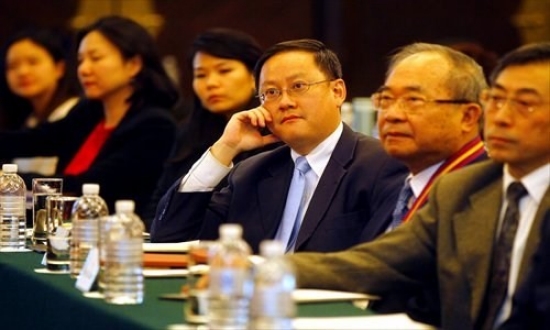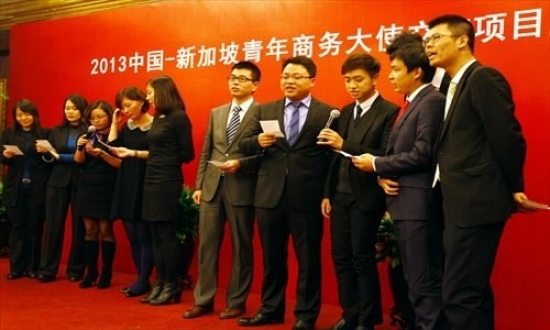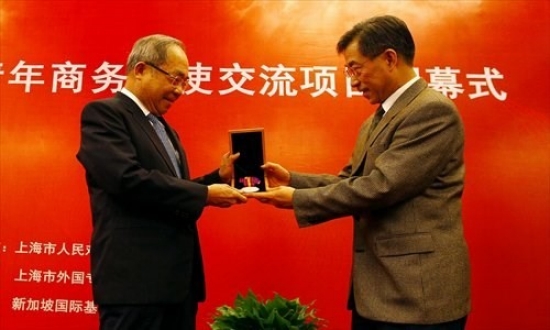23 Dec 2013
By Liao Fangzhou


A critical role
Ong Siew Gay is enthusiastic about the program. "The young ambassadors play a critical role in strengthening our people-to-people relationships. By spending 10 weeks working and living in each other's cities, they gain a keen understanding of the local business environment and forge strong friendships. We hope that they will harness these valuable social networks and connections to promote greater bilateral cooperation in future," Ong said.
Banking and finance is a vital sector and this year Eo Xiang Jing, a 28-year-old customer management assistant from Singapore's DBS Bank, came to work at the Shanghai Pudong Development Bank. "I found openness a major characteristic of the corporate culture in Shanghai. This is positive for efficiency and I am glad that it is practiced here too," Eo said.
He said both banks emphasized delivering the right service at the right time to the right customer, and he found aspects of the Shanghai bank good models. "One of the things I found worth learning was the software and systems used to run customer campaigns - they seemed more integrated than ours."
Eo said his biggest gain from the YBA program was learning about the people and the culture, and having the opportunity to be exposed to a foreign market and work. "The program drives and builds maturity in individuals and all this learning will critically form what the individuals stand for in the long run."
Expansion in tourism
The 2013 YBA program also witnessed an expansion of the tourism sector. Rebecca Koh, a manager from Singapore's Sentosa Leisure Management and Feng Yun from the Shanghai Fengxian Tourism Development Agency went on exchange along with Shao Xudong, from the secretary of the People's Government Office of Fengxian, who went to work with Singapore's largest tourism company, Resorts World Sentosa (RWS).
The 26-year-old Koh explored historic and eco-tourism products in Fengxian - she noted that they were very different from the beach tourism packages her own company offered and although those tourism products might not have been relevant or applicable to Sentosa, they had helped her gain new insights as a tourism professional.
"The experience has broadened my perspective and helped me gain valuable insights into the Chinese market - for instance the approaches to domestic and international travel. Being in the tourism industry, it is important for me to understand tourism and market preferences outside my home country," Koh said.
She said she had looked forward to being fully immersed in Chinese culture and expanding her network in China, and the actual experience had exceeded her expectations. "I was also very fortunate to be able to meet many Chinese colleagues and friends who showed me warmth, hospitality and generosity."
The other exchange partner, Feng, found herself sitting at Koh's desk in Singapore for 10 weeks. "This was a great chance to observe, experience, and study Singapore close up," she said.
Feng was enthusiastic about the efficiency of Singapore's government and administration and found the city-state's cultural fusion impressive. "The Chinese are a larger ethnic group than the Malaysians and Indians but the society is not at all Chinese-dominant. The city planners make sure that in every district the residents are racially mixed to enhance coherence."
Food for thought
Feng also spent time studying the island resort of Sentosa. "I found that this tourism complex, contrary to the general assumption or belief, in fact brings very limited benefit to other tourist attractions nearby. This has made me think about the Disney project in Shanghai in a different light and consider seriously how to turn wishful blueprints into reality."
Thirty-year-old Shao told the Global Times that his first exchange choice was to work with the Singapore Economic Development Board but he now thought he had gained a lot more by working with the tourism company. "This is an international and professional private business where I learned how to explore the market, do marketing and promotion, and reduce risks. It gave me an authentic experience of how the private sector works and what these companies really care about. I think this was a very good lesson on handling the relationships between a government and the market."
During his time at the RWS he helped the staff understand China's new tourism regulations. Introduced in October, the law now forbids travel agencies' tour packages from including compulsory shopping excursions, extra service fees or other items as additional charges. As a result, tourist agencies with groups heading to Singapore started charging more and tourism companies, including the RWS, were very concerned at the impact of the new rules.
"I explained what I thought drove Chinese tourists along with the things they preferred and behavioral patterns. I said that although in short term the number of tourist groups from China to Singapore would decrease, the need for individual and semi-individual tourism was on the rise and these were usually people with a higher capacity for consumption. I recommended that the company redesigned its tour packages, and changed promotions to catch the eyes of individual tourists."
